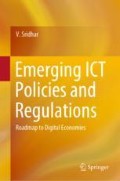Abstract
Over-the-top (OTT) services as they are called are communication and broadcasting services rendered over the Internet. In recent times, OTT services have become ubiquitous thanks to the underlying broadband services provided by the telecom and Internet service providers . However, OTT services sometimes complement and other times substitute the traditional telecom and broadcasting services offered by the incumbent licensed operators. These OTT services offered over the ubiquitous Internet are challenging to the regulators as the underlying technology continues to evolve at much faster pace. While telcos lobby for the regulation of OTT services on grounds of level playing field, the OTT service providers resist as their service is innovative and in the spirits of the free Internet. In this chapter, we try to address the following questions with reference to OTT services:
-
Should OTT services be regulated?
-
Should there be level playing field between telecom operators/broadcasting service providers and OTT service providers?
About 5–6 years ago, telecom was essentially voice, today it has become massive data pipes. India is today consuming and transporting data which is more than US and China networks combined. The per capita data consumption is the highest in the world and overall quantum is the highest. Therefore, it raises the issue of storage, transmission, treatment and security of that data, we had to examine these very important elements and the framework around it.
—Shri R. S. Sharma, Chairman, TRAI.*
*Available at: https://economictimes.indiatimes.com/industry/telecom/telecom-policy/new-paper-on-whether-to-regulate-apps-in-the-works-says-trai-chairman-rs-sharma/articleshow/65030047.cms accessed on 23 Jan 2019.
Access this chapter
Tax calculation will be finalised at checkout
Purchases are for personal use only
Notes
- 1.
Partly based on article that appeared in FINANCIAL EXPRESS on 27 Dec 2018 with the permission of The Indian Express (P) Limited.
- 2.
Partly based on article that appeared in FINANCIAL EXPRESS on 27 Dec 2018 with the permission of The Indian Express (P) Limited.
- 3.
Partly based on article that appeared in FINANCIAL EXPRESS on 27 Dec 2018 with the permission of The Indian Express (P) Limited.
- 4.
Partly based on article that appeared in FINANCIAL EXPRESS on 27 Dec 2018 with the permission of The Indian Express (P) Limited.
References
BBC News. (2018). Duty, Identity and Credibility: Fake News and the ordinary citizen of India. Available at https://downloads.bbc.co.uk/mediacentre/duty-identity-credibility.pdf. Accessed January 28, 2019.
Department of Telecommunications (DoT), Government of India. (2015). The Indian Telegraph Act 1885 (Amended). Available at http://dot.gov.in/sites/default/files/Indian%20Telegraph%20Act%201885.pdf?download=1. Accessed on 10 May 2019.
Ghemawat, P., & Altman, S. (2013). Depth index of globalization 2013: And the big shift to emerging economies. Available at http://www.ghemawat.com/dig/. Accessed August 15, 2014.
India Today. (2018). WhatsApp limits forwarding messages to 5 chats: Here is how it will change the way you chat. Available at https://www.indiatoday.in/technology/features/story/whatsapp-limits-forwarding-messages-to-5-chats-here-is-how-it-will-change-the-way-you-chat-1291013-2018-07-20. Accessed January 28, 2019.
Mckinsey Global Institute (MGI). (2016). Digital globalization: The new era of global flows. Available at www.mckinsey.com/mgi. Accessed April 1, 2016.
Ministry of Information Broadcasting (MIB). (2013, September 6). Gazette Notification on Government mandated Television channels. Available at http://digitalindiamib.com/Notitfication_regarding_mandatory_carriage_of_DD_Channels_-_cable_TV.pdf. Accessed February 3, 2018.
Ministry of Information Technology (MeitY), Government of India. (2008). The Information Technology Act 2008.
Ministry of Information Technology (MeitY), Government of India. (2011, December). The Information Technology [Intermediary Guidelines Rules] 2011.
Ministry of Information Technology (MeitY), Government of India. (2018a). The personal data protection bill, 2018.
Ministry of Information Technology (MeitY), Government of India. (2018b, December). The Information Technology [Intermediary Guidelines (Amendment) Rules] 2018.
Raja, K., & Sridhar, V. (2018, December 27). To regulate OTTs or not. Financial Express.
Sridhar, V. (2012). Telecom revolution in India: Technology, regulation and policy. New Delhi, India: Oxford University Press.
Sridhar, V. (2016). Cross border digital flows and its economic impacts. In: 14th South Asian Network of Economic Research Institutes (SANEI) Annual Conference, Kathmandu, Nepal, 7–8 November 2016.
Sridhar, V. (2018, September). EU GDPR: Privacy matters. Advanced Computing & Communications, 2(3).
Statista. (2018). Hotstar: The star of the Indian video streaming market. Available at https://www.statista.com/chart/15939/indian-video-streaming-market-share/. Accessed February 3, 2018.
Telecom Regulatory Authority of India (TRAI). (2009, March). Consultation Paper on DTH Issues relating to Tariff Regulation & new issues under reference. Retrieved March 10, 2009 from http://www.trai.gov.in.
Telecom Regulatory Authority of India (TRAI). (2015, March 27). Consultation paper on regulatory framework for Over-The-Top (OTT) services. Available at www.trai.gov.in. Accessed March 30, 2015.
Telecom Regulatory Authority of India (TRAI). (2017, March 3). The Telecommunication (Broadcasting and Cable Services). (Eighth) (Addressable Systems) Tariff Order, 2017. Available at www.trai.gov.in. Accessed November 15, 2018.
Telecom Regulatory Authority Of India (TRAI). (2018, July 19). The telecom commercial communications customer preference regulations, 2018. Available at www.trai.gov.in. Accessed August 10, 2018.
Telecom Regulatory Authority of India (TRAI). (2018, November 12). Consultation paper on regulatory framework for Over-The-Top (OTT) communication services. Available at www.trai.gov.in. Accessed November 15, 2018.
Author information
Authors and Affiliations
Corresponding author
Rights and permissions
Copyright information
© 2019 Springer Nature Singapore Pte Ltd.
About this chapter
Cite this chapter
Sridhar, V. (2019). Over-the-Top (OTT) Services—Should They Be Regulated Much like Telecom Services?. In: Emerging ICT Policies and Regulations. Springer, Singapore. https://doi.org/10.1007/978-981-32-9022-8_11
Download citation
DOI: https://doi.org/10.1007/978-981-32-9022-8_11
Published:
Publisher Name: Springer, Singapore
Print ISBN: 978-981-32-9021-1
Online ISBN: 978-981-32-9022-8
eBook Packages: Economics and FinanceEconomics and Finance (R0)

